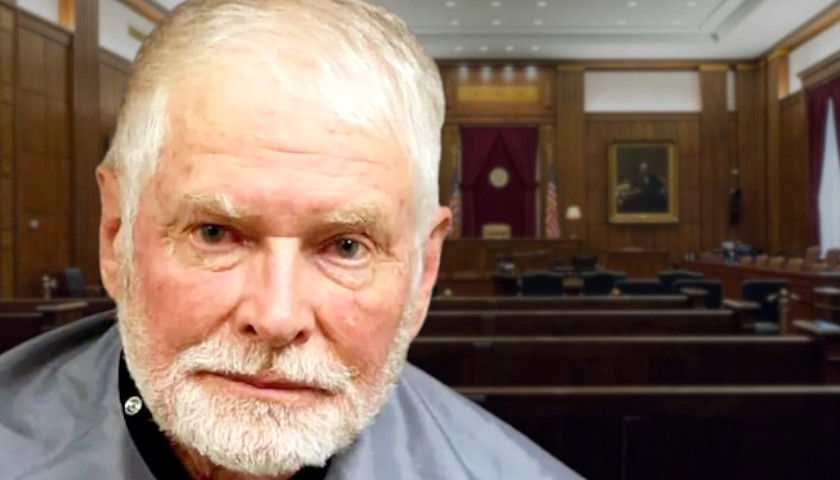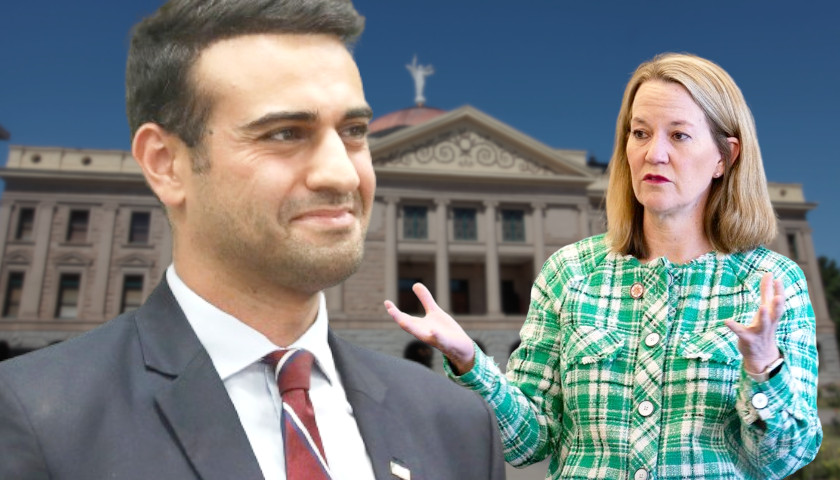The retired Ernst & Young partner and Ohio Republican Party (ORP) central committee member, leading a lawsuit against the Ohio Republican Party and its Chairman Robert A. Paduchik and the party’s Treasurer David W. Johnson over questions in the party’s governance and books, responded to the December 30 “Open Letter to Ohio Republican Leaders” written by Johnson.
“The accuracy of the financial statements of the Ohio Republican Party is very germane to the integrity and strength of the party,” said Mark A. Bainbridge, who filed his November 29 lawsuit with four other members of the ORP’s central committee.
“I take great exception to many statements published by ORP Treasurer David Whipple Johnson in his ‘Open Letter to Ohio Republican Leaders,’” he said.
Bainbridge said Johnson was misleading people when he claimed that the Ohio Republican Party’s financial statements were in any way audited or given a clean bill of health by Ohio Secretary of State Frank LaRose.
The two men had breakfast together before Bainbridge made his response, and then and there, the secretary of state made it very clear.
“He confirmed to me that his office does not audit any campaign information submitted to them by political parties. You can call Frank’s cell at (330) 461-**** to confirm this.”
In addition, the state auditor has no authority to audit nongovernmental agencies like political parties, he said.
“Johnson’s comment that the ORP financial statements have been in effect, under state audit by the Ohio Secretary of State or Federal Election Commission is a total fabrication,” Bainbridge said.
He said that the secretary of state or FEC certainly does not audit the ORP’s financial statements.
“Ohio’s secretary of state has a ministerial role and makes sure all the boxes are completed for the ORP and other campaign finance filings but does not audit the filings to make sure the numbers put in the filings are correct,” he said.
Bainbridge also took issue with Johnson writing that he was not a whistleblower, but rather: “a two-bit con artist who cannot be trusted to tell the truth.”
The retired E&Y partner said Johnson missed some parts of his resume.
“I am a CPA with over 40 years of experience and retired partner from a Big Four international accounting firm,” he said. “I have audited organizations of all sizes, including some of the largest employers in the United States.”
In his letter, Johnson quoted Mark Twain, which Bainbridge took on right off the bat.
“True! Mark Twain was correct that figures don’t lie,” Bainbridge said.
“Look at the figures in the ORP financial statements, and you will see with your own eyes a decrease in ORP equity of $1,716,276 and $436,574 in 2017 and 2019, respectively. See the attached ORP financial statements. What is the explanation for these decreases?” he said.
“Johnson is silent and provides no explanation,” he said.
“Why have members of the State Central Committee been denied access to the books and records to see why these decreases were recorded?” he asked.
Bainbridge said it is wrong that the committee with oversight over the party should be boxed out from its financials. “No governing board member should be denied access to an organization’s financials, especially when the financials are missing important information! Mark Twain would want to know.”
The Columbus resident’s next issue was Johnson’s assertion in his letter that he and his co-plaintiffs are suing the entire State Central Committee.
“False! —This is untrue,” he said. “The case was filed against Paduchik and Johnson in their official capacities at the ORP.”
Bainbridge said no one else is named.
“Dave Johnson was the only SCC member named in the lawsuit as a defendant,” he said.
“The Plaintiffs have been very careful not to implicate their colleagues, and no SCC members, besides Johnson, is being sued,” he said.
Bainbridge also said that one of the reasons he and his co-plaintiffs launched their suits was demanding the party submit to an audit, claw back improper payments, and restore committee members to their subcommittee assignments after the chairman removed them.
“Remember, when we were stopped from working within the ORP governance structure, removed from standing committees, and prevented from exercising our fiduciary duty to Republican voters, the plaintiffs were left with no other recourse than to file suit,” he said.
In his letter, Johnson said an inadvertent accounting code error was responsible for what Bainbridge claims is $3 million missing from the ORP accounts.
The retired Ernst & Young partner, now operating his own private CPA practice, said it was more accurate to say that the $3 million is missing without explanation.
Johnson wrote that the coding error inadvertently placed a paid party invoice into the accounts receivable ledger.
Bainbridge said this is also not true, and he relies on a May 24 memorandum written by the party’s Executive Director Justin Bis and his conversation with Bis on the subject.
“Justin Bis told me that Tom Dains, the person who made the accounting entries, provided him with the detailed attachment to the memorandum,” he said.
“Bis told me he didn’t understand the attachment, nor did he even question Dains about the details of the attachment,” he said.
The certified public accountant said he understands what Dains did, even if the party’s executive director and treasure do not.
“I have explained the unanswered questions about the memorandum in prior letters to the State Central Committee.
“Johnson and Dains did not even realize the $640,000 receivable was recorded on the balance sheet for over three years until I asked a question about it in March of 2021,” he said.
“Based on Bis’ memorandum, this was a whole series of accounting errors from 2016-2019, not an inadvertently paid invoice,” he said.
Bainbridge said that the accounting errors resulted in errors to both the ORP balance sheet and profit and loss statement in 2017 and 2018.
“Is it too much to ask that the SCC get a professional opinion from a CPA on these errors?” he said. “Why has it taken months, and why is ORP management afraid to answer these questions?
Another issue Bainbridge addressed in his response to the Johnson letter is the matter of former party chairwoman Jane Timken’s review of the party’s finances upon her taking over the party leadership in 2017.
In his letter, Johnson wrote that Timken’s 32-page report was an independent fiscal review, which was a code-switch.
“Johnson has changed the term and is now calling the 2017 RightSide Compliance report an ‘independent fiscal review’ and not an audit,” Bainbridge said.
“All along, the ORP has erroneously claimed the 2017 report is an audit,” he said.
“Anyone in business can tell you there is a big difference, and anyone who tells you the 2017 report was an audit is not being truthful,” he said. “I have read the RightSide Compliance report, and it covers the period Jan. 1, 2016, to Dec. 31, 2016, the last year when Matt Borges was chairman of the ORP.”
Bainbridge said it was wrong for party officials to repeatedly refer to the 2017 report as an audit, mainly because the company doing the review is a political consulting firm.
“Under the law, only CPA firms can perform an audit of any nongovernmental organization’s financial statements, and an audit of the ORP has not been performed for at least 16 years,” he said.
The review, however, is a devastating revelation of poor practices at the Ohio Republican Party with valid recommendations, he said.
The recommendations that the party did not adopt were developing internal controls, implementing an audit process, establishing policies and procedures, hiring professional and competent accounting professionals and converting the party to the Generally Accepted Accounting Principles.
“If Johnson is telling the truth, why doesn’t he provide SCC members with copies of the 2017 ‘independent financial review’ or any financial statement audits that has been completed since Johnson became treasurer?” he asked.
Johnson, in his letter, repeated a narrative that is also promoted by Paduchik and members of the party’s staff, which says that Bainbridge and other party leadership critics do not understand that the party’s books are kept using a cash-based accounting model, nor how that model works, especially for a non-profit.
Bainbridge, who throughout his career worked with non-profit clients and consulted them on proper governance, said he is well familiar with how the ORP books are kept.
“A basic Accounting 101 principle is that beginning equity plus or minus the net income or bottom-line equals ending equity,” he said.
“This means that no accounting entries can be made directly to the equity section of the balance sheet but must be recorded in the profit or loss statement or what is normally called the statement of activities for not-for-profit organizations like the ORP,” he said.
“GAAP requires the financial statements reconcile the equity at the beginning of the period to the equity at the end of the period,” he said. “This reconciliation is required, so the readers of the financial statements are aware of any accounting entries were not included in the net income and incorrectly recorded directly to equity.”
“The problem with the ORP’s equity is not that it changed, but it changed by an amount different from the net income,” Bainbridge said.
The CPA said an example of this equity is seen in the ORP’s balance sheet from Dec. 31, 2017, through Dec. 31, 2019. “There was a decrease of equity of $1,716,276 and $436,573, respectively, that are not recorded in the net income.”
“Accounting 101 also requires that Assets = Liabilities + Equity,” he said.
“If the accounting system did not make these $1,716,275 and $436,573 adjustments to “Retained Earnings,” the balance sheets would not balance on Dec. 31, 2017, and 2019,” he said.
For the last seven months, Bainbridge said he had been frustrated in his attempts to find out what happened to the missing equity. “The question I have been asking since March 2021, when I first saw these balance sheets, is: What are these significant entries that did not go through the income statement?’”
Johnson and Paduchik want to pretend that these figures are not from balance sheets provided by the party itself, he said.
“I have also requested the balance sheets with the equity section for the years ended Dec. 31, 2016, Dec. 31, 2018, and December 31, 2020, but Paduchik and Johnson have refused to provide them to me,” he said.
Bainbridge said the QuickBooks reports provided by the party leaders to the State Central Committee members did not include an equity section, he said.
“In other words, the balance sheets given to the SCC do not balance,” he said. “I understand from experts who teach the use of QuickBooks that the QuickBooks accounting system used by the ORP always includes an equity section,” he said.
Bainbridge said he also made the point in his November 24 letter to SCC members and his remarks at the December 3 SCC meeting that unexplained decreases in equity have continued into 2021 with unexplained decreases in equity of approximately $300,000.
– – –
Neil W. McCabe is the national political editor for The Star News Network. Send him news tips: [email protected]. Follow him on Twitter: @neilwmccabe2.








